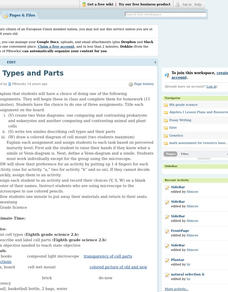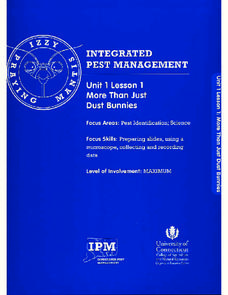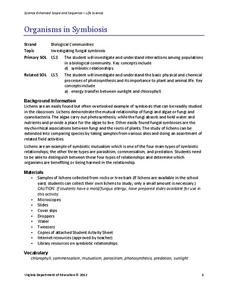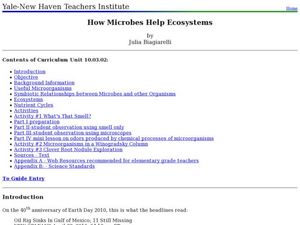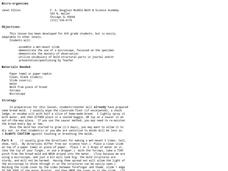Curated OER
Cells And Their Parts
High schoolers investigate different types and their parts. They differentiate prokaryote and eukaryote cells and create a venn diagram displaying differences or similarities. Students write ten similes related to the cells and parts of...
Curated OER
Creating a Universally Designed Lesson Plan
Students investigate plant cells. In this multiple intelligences lesson, students engage in a variety of activities to foster an understanding of plant cells and how they work. Students read, write, observe, and role-play parts and...
University of Connecticut
More Than Just Dust Bunnies
Teenagers will never complain about cleaning their rooms after this activity. In the first lesson of a four-part series, budding scientists collect samples of dust, chalk, and other particulates from various areas of the classroom. They...
Nuffield Foundation
Observing Water Moving Through Plants
We know plants assist in the water cycle, but how do plants get water from the ground into the air? Through a series of demonstrations or labs, scholars observe the movement of water through plants. They microscopically view the cells...
Rural Science Education Program
Bees and Flowers – Partners in Pollination
Why are bees so important? After several activities where kids investigate the form and function of flowers, they learn about the different types of bees and label them. They then examine pollen under a microscope and decide which bees...
Curated OER
Algae Part One: An Introduction
Students have the opportunity to view two types of algae under 400x magnification with a compound microscope. They make observations and record their observations through drawings and words. In addition, they identify different qualities...
Science Matters
Matter Cycles — Sum It Up
Scholars become part of the cycle of matter with a reader's theater that showcases producers, consumers, decomposers, and the sun. A diagram and discussion concludes the learning experience and enhances comprehension.
Odell Education
Plant and Animal Cells
Incorporate multiple facets of the cell into your next high school lab! Through an introduction to cell organelles, class members observe each cell type and draw visuals to further demonstrate understanding of cellular processes in both...
Curated OER
Discovering Cells
High schoolers will learn about the pioneers who discovered the cell and its parts. They will be able to relate advances in microscope technology to the discoveries. Students diagram a time line and answer questions at the end to check...
Science 4 Inquiry
Plant Structures Lab Stations
In China, hibiscus is known as the shoe flower because it is used to polish shoes, while in Hawaii, it is honored as the state flower. Young scientists learn about the structure and function of flowers. They dissect hibiscus flowers,...
Institute of Electrical and Electronics Engineers
Be a Scanning Probe Microscope
Extensive reading is done in order to learn about scanning probe microscopy and nanoscale. Afterward, individuals use a pencil to probe an unidentified object that is inside of a box so that they cannot see it. Using only what they could...
Virginia Department of Education
Organisms in Symbiosis
Searching for an activity that allows emerging biologists to explore symbiosis up close and personal? Pupils collect samples and view lichens through a microscope and conclude with a discussion about the relationship they have with other...
Curated OER
Seeing Cells
Students discuss what comes to mind when they hear the term cell and discuss what a cell is in biological terms. They look at pictures of cells and color a picture of a cell diagram, writing the job of each part as they go. After the...
Curated OER
Exploring Magnification and the Micro-world
Students examine what magnification is and does. In this microscope and magnification lesson, students listen to a reading of Greg's Microscope by Millicent E. Selson which explains what a microscope does. They talk about magnification...
Curated OER
Seed Detectives
Students examine seed coats. For this biology lesson, students look at pictures of magnified seed coats, then use hand-help magnifiers or microscopes to look at seed coats on their own.
Curated OER
Examining a Microchip
In this computer technology lesson students investigate silicon microchips. Students explore microchip technology using a microscope. Lesson contains hands on investigations.
Curated OER
Focusing on Lenses
Young scholars explore scientific observations by examining the parts of a microscope. In this optics lesson plan, students discuss the importance of a focal point and focal distance when utilizing an optical device such as a microscope....
Curated OER
Pond Life Identification Kit
Learners explore ecology and biodiversty. They use the wet-mount procedure to make several slides to view using the microscope and draw what they see.
Curated OER
Waterworks
Students investigate the water quality of a river. For this water quality lesson plan, students use microscopes, probing devices, and global positioning systems to determine water quality and create presentations on it.
Curated OER
How Microbes Help Ecosystems
Sixth graders observe different microorganisms under the microscope. In this biology lesson, 6th graders draw and describe the samples they see. They study the root nodules of plants and explain how the plants benefit from those bacteria.
Curated OER
Stomata: Microscopic Openings that Let Plants Breathe
Learners participate in a lab experiment to observe and measure the opening and closing of stomata. They focus on photoperiod, locate and identify stomata on a leaf and explain the role of stomata in the daily functioning of a plant.
Curated OER
Introduction To Insect & Spider Body Parts
Students inspect several different specimens of insects and spiders to determine characteristics that are similar and different between the two groups. They identify the basic body structure of spiders and insects and then predict where...
Curated OER
Plant Structure and Function
Students examine the structure of Velcro and its function then relate it to seeds and seed stock. In this experimental lesson plan students test seed activity and what its function is for the plant, examine seeds under a microscope, and...
Curated OER
Micros-organisms
Sixth graders examine mold with a microscope. In this micro-organisms activity, 6th graders use teacher-prepared mold samples to prepare a wet-mount slide and examine the mold under a microscope then draw and label what they see.
Other popular searches
- Parts of a Microscope
- Compound Microscope Parts
- Label Microscope Parts
- Microscope Parts Functions
- Parts of the Microscope
- Parts of Microscope
- Identify Microscope Parts
- Biology Lab Microscope Parts
- Microscope Parts Lab
- Microscope Parts and Use
- Parts of the Microscope Pdf


